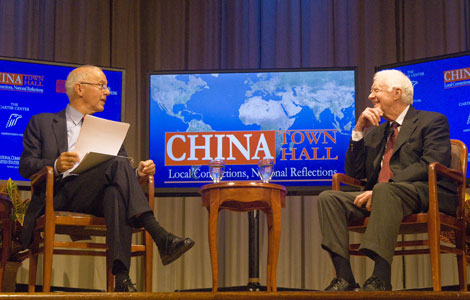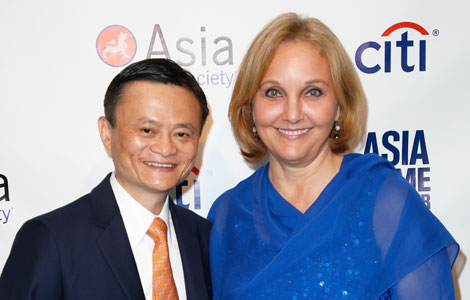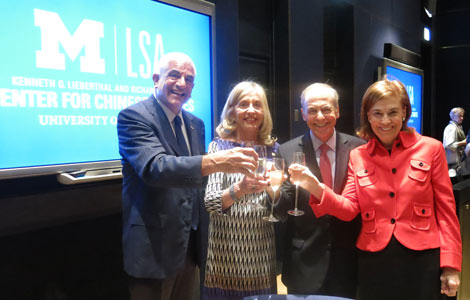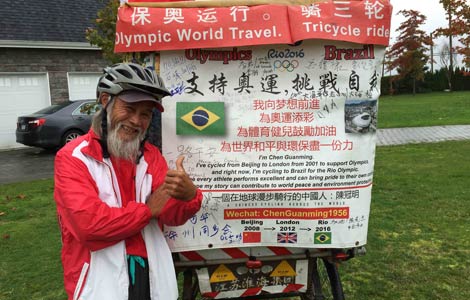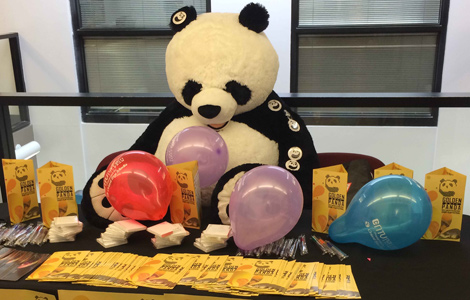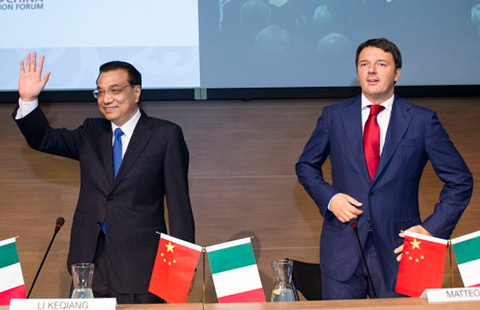Gift of love and joy
Updated: 2014-10-17 12:08
By Chen Weihua(China Daily USA)
|
||||||||
|
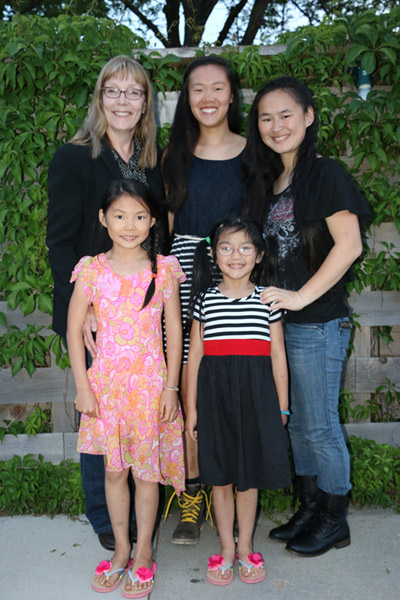 Kathryn Bauermeister (top row left) and her four daughters adopted from China. Clockwise from top center: Lulu, Emily, Ella and Zoey. Chen Weihua / China Daily |
Chinese children adopted by Americans have not only had their lives changed, but have changed the lives of their new families, Chen Weihua reports from Washington.
Kathryn Bauermeister is a single mom of four girls, all from China.
The Minneapolis, Minnesota, woman adopted them one by one from Chinese orphanages beginning in 1996.
Emily, the eldest and a senior at a private college in Minneapolis, is very creative and into art and photography. Lulu, the second daughter and a high school senior, is great in sports and in her studies. She is getting ready to apply to college, probably with some Ivy League schools in mind, Bauermeister told China Daily.
The two younger daughters, Zoey, a 4th grader, and Ella, a 2nd grader, love acting and completed a theater training camp this past summer.
To give her children more opportunities and choices, Bauermeister works several jobs. She teaches at an elementary school in Minneapolis; represents a Chinese organization that conducts educational exchanges in the United States and trains local youth from low-income families to learn job skills and how to apply for jobs for several Twin Cities organizations. There is more.
"I am probably the hardest worker of anybody I know," said Bauermeister in an upbeat tone. "Though many things are hard, I have a strong belief that it's all good. The difficult things also make me stronger."
Bauermeister would occasionally buy lottery tickets. "If I win the lottery, what will I do with the money? I will adopt more kids," she said, with a smile on her face.
She would also like to have a much bigger house, a van, and a big garden where she and the girls can grow their own food, and maybe keep some chickens to lay eggs.
"I would love that lifestyle," said Bauermeister.
She would also like to go to China more often to work with some organizations to raise money for orphanages there and help bring more kids from the orphanages to the US for medical treatment and visit programs.
"So I won't be slowing down," she said.
Growing up
Though the girls' interests are varied, Bauermeister had hoped one of them would become a dancer or ballerina, since she herself loves dancing.
She has also been deliberately nurturing their wide interests over the years, taking them to gymnastics, art and musical-instrument classes, from piano and flute to violin and ukulele.
But she has been adjusting her expectations lately. "The longer I have been parenting, the more I just go with the flow," she said.
For Bauermeister, having four girls, two older ones and two younger ones, works out just fine. They each have a playmate. So when Bauermeister was still pursuing a graduate education years ago, the older girls could babysit the younger ones.
Despite holding several jobs, Bauermeister said she spends as much time with her children as anybody she knows.
Together with the girls, they have been active in fostering dogs and helping dog adoption by taking dogs to meet their new families.
Bauermeister also took Emily and Lulu with her to Haiti twice more than 10 years ago to help the children there living in orphanages. Earlier this year, Lulu went to Costa Rica to sharpen her Spanish-language skills.
Whenever Bauermeister went to China for adoption, she always brought duffle bags of toys and clothing for the orphanages.
For Peggy Scott, a film producer living in Berkeley, California, the feeling of having a daughter adopted from China in the past 21 years is a wonderful one.
"I think I am the luckiest parent in the world," said Scott, also a single mother.
Her daughter Abigail was adopted from an orphanage in Changsha, Hunan province, in 1994, and is now a senior majoring in sociology at a college in Los Angeles.
"I have a wonderful daughter. She is very intelligent, and very sweet, and very funny and extremely loving, and we have a terrific relationship and she always made a lot of friends," Scott said.
"I feel I won the jackpot" she said of her daughter, who is turning 21 this month.
Scott said that as a single mom the choices for adoption were very limited. She thought she could only go to Guatemala. She then heard of someone who went to China for adoption.
"I don't know how to put this. I just felt everything opened up. I was like 'I'm going to China'. It was a spiritual experience," Scott recalled, with lots of excitement in her voice.
"I thought my child was waiting for me in China," she said. "I just know I needed to be a mom and I was going to make it happen."
At that time, Scott had not been to China yet, but had worked with a lot of Chinese people and spent plenty of time in Chinatown in San Francisco.
"I am just so comfortable going to China. I didn't have any relationship to Guatemala. It didn't matter that it's closer," she said.
It took Scott 13 months to get her daughter on January 26, 1994, when Abigail was 3 1/2 months old.
Returning to China
Unlike many Chinese parents who may not tell their adopted children where they came from, Americans are more open.
"From the beginning I talked to her about it. Everybody talks to their baby all the time. So I would tell her stories about China. I would tell her the day I met her was the best day in my life," Scott said.
But she noted that more than half a century ago, it was also true in the US that people didn't talk about this, regarding it as shameful or embarrassing.
When Abigail turned 12, Scott took her to China. Besides touring Beijing, Xi'an, Chengdu, Guilin and Yangshuo, they went to Changsha with another family who had adopted their child from an orphanage in Zhuzhou, not far from Changsha.
The two families were very well received at the children's welfare institute, as the orphanage is called in China.
Scott still remembers her daughter was kind of scared before they went into the orphanage. Once inside, that disappeared. "It didn't feel like a scary place, just like a boarding school," said Scott, describing the room, with beds, desks and pictures on the wall, just like a normal dorm.
Scott took the aunties and uncles and children at the orphanage to dinner and bought new clothing and new shoes for the children. "We spent a few hours with them. We had a great time," she said.
For Bauermeister, taking daughters Emily and Lulu on a return visit to their orphanages in 2008 resulted in mixed feelings.
At the orphanage in Ma'anshan, Anhui province, where Emily was adopted as a 4-year-old, Bauermeister and her two daughters had a wonderful experience. They met the same orphanage director and the same nanny who took care of Emily.
"We remember they just looked the same and they were so loving and welcoming, they had a whole day planned for us, got us mangos and took us out for a big banquet," Bauermeister said.
The orphanage also showed them all the greeting cards and photos Bauermeister sent them over the years. "It was so welcoming," she said, tears in her eyes.
However, this may not always be the case. Bauermeister noted that there was not much information available at Lulu's orphanage. The director had changed and had no personal knowledge of Lulu and her time there. She said the family may try to visit Lulu's orphanage again in a few years.
Birth parents
While some Chinese children adopted by Americans have gone back to look for their birth parents, Bauermeister said she is open to it but the girls seem to have had little interest.
"It's their decision, I would go if they wanted to," she said.
She noted that she has an acquaintance whose daughter came from the same social welfare institute that Emily came from. She stood in the public place with a sign with her Chinese name and birth date and finally found her birth parents. This was documented in the film Somewhere Between about four teen adoptees who returned to China together and told stories about their experiences. The film tells how difficult it was, yet doing so still provided some of the missing pieces to the puzzle that many adopted children seek.
Scott from Berkeley believes her daughter does not hate her birth parents at all for abandoning her. But she doesn't think she can find them, partly because she was from a big city.
"She has some understanding of how difficult it was (for her birth parents), and many people made difficult decisions," Scott said. "She feels sad that they had to make such a hard decision, but (she is) not angry."
According to China's Ministry of Civil Affairs, 24,460 Chinese orphans were adopted in 2013, compared with 50,000 in 2006. Of that total, only 3,320 orphans were adopted by families from overseas last year, down from 13,000 in 2005. China opened its doors to foreign adoption after the country's adoption law went into effect in 1992.
The US continues to be the major source of overseas applicants who want to adopt Chinese children. For years, China, Ethiopia, Russia, South Korea and Ukraine have been the top feeder countries to the US, according to US State Department reports.
China first allowed adoptions to the US in 1991 when 61 children were issued immigrant visas. The number of adoptions from China increased sharply in the 1990s, peaking at 7,906 in 2005. More than 86,000 immigrant visas were issued to Chinese orphans from 1991 to 2013, according to the State Department.
Secretary of State John Kerry said last November that over the past decade, more than 200,000 children from over 100 countries were adopted by American families.
However, adoption from China has become more difficult in recent years as demand of domestic adoption in China has risen while the number of orphans is on the decline.
Shannon Phillips, a marketing manager at the Great Wall China Adoption, based in Austin, Texas, said they have people still waiting who filed their adoption applications in 2006 for healthy babies from China.
Phillips said if people are open to a child with certain special needs and older than 2, the process could be very simple and fast, adding that it will still take about a year.
The cost for adoption from China varies depending on travel expenses to China for the adoption. And that will be on top of the $25,000 to $30,000 charged by the Great Wall, according to Phillips.
The agency placed some 150 children from China with Americans last year; most had special needs and were older than 2.
Phillips said Americans adopt from China because the country "is very organized in the adoption process compared with other countries, where there are a lot of gray areas". "Not everybody is willing to take a risk," she said.
China ratified the Hague Convention on Protection of Children and Cooperation in Respect of Inter-country Adoption in 2005. The convention is designed to protect children adopted across national boundaries.
The China Center for Adoption Affairs (CCAA), set up in 1996 by the Ministry of Civil Affairs, and now going by the initials CCCWA (China Center for Children's Welfare and Adoption), is responsible for both the domestic and international adoptions as well as overseeing the welfare of orphans in those children's welfare institutes.
China has set strict requirements for adopters, which include an age limit, minimum income and physical and mental health status. Homosexuals are not allowed to adopt from China.
American celebrities
Some politicians and celebrities have been among the tens of thousands of American families who have adopted children from China.
Former Utah Governor Jon Huntsman Jr, also a former US ambassador to China from 2009 to 2011, and his wife Mary Kaye adopted their daughter Gracie Mei in 1999 from an orphanage in Yangzhou, Jiangsu province.
The family has seven children, including one adopted from India in 2006.
Besides Huntsman, Secretary of State John Kerry's older sister, Peggy Kerry, a long-time staffer at the US mission in the UN, and her husband George Kaler, a medical school dean, also have a daughter adopted from China in 2001.
Born in China in 1998 and found abandoned outside the Chongqing long-distance bus station on September 10, 2000, Iris also appeared in the campaign when Kerry ran for president in 2004.
In his remarks at the National Adoption Month last November, Kerry described his niece Iris as "one of the most extraordinary young women I've ever known."
"From the day she came into our family, she has filled our lives with love and joy. And every time I'm with her, I am grateful my sister Peggy was able to adopt her from China years ago," Kerry said.
Hollywood actress Meg Ryan also adopted a 14-month-old girl from China in 2006. On the David Letterman TV show a few years ago, Ryan described her daughter as "a ridiculously happy person. It was the happiest word I could think of."
Many Americans have posted their happy experiences of adopting children from China on YouTube.
One, posted by Mick Hooper, recorded the adoption trip to the children's social welfare institute in Maoming of south China's Guangdong province, and has attracted more than 160,000 viewers over the last five years.
"I'm in tears already at two minutes in. My cousin was adopted from China. She's a beautiful, smart, creative 11-year-old now, and such a blessing to our family," commented a viewer named Amelia on the video.
Back in Minneapolis, Bauermeister showed a Mother's Day photo book her daughters made for her this year.
"I love it. It's just special," she said.
She said she wanted to teach the girls to be sensitive to others, to have a loving attitude, to follow the right path and to help others in their lives.
"That's why we are here, to help others and make the world a better place in the long run," said Bauermeister.
Contact the writer at chenweihua@chinadailyusa.com
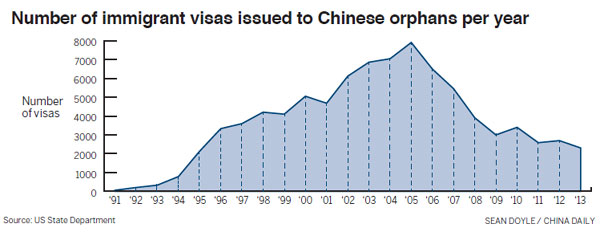
(China Daily USA 10/17/2014 page20)
Most Viewed
Editor's Picks

|

|

|

|

|

|
Today's Top News
China-US summit will echo Sunnylands meeting
Obama may name Ebola 'czar'
Alibaba keeps analysts bullish month after IPO
Talks with HK protesters could start next week
More measures expected in China's healthcare reform
Alipay targets retailers with new services
Ambassador optimistic on China-Canada relations
The tenth Asia-Europe meeting opens in Milan
US Weekly

|

|
